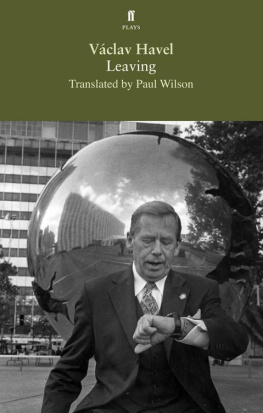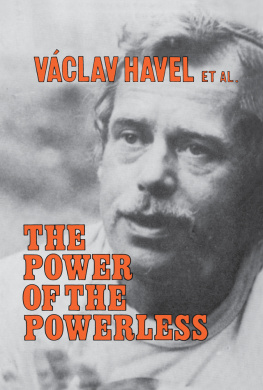Vaclav Havel - Leaving
Here you can read online Vaclav Havel - Leaving full text of the book (entire story) in english for free. Download pdf and epub, get meaning, cover and reviews about this ebook. year: 2013, publisher: Faber and Faber, genre: Home and family. Description of the work, (preface) as well as reviews are available. Best literature library LitArk.com created for fans of good reading and offers a wide selection of genres:
Romance novel
Science fiction
Adventure
Detective
Science
History
Home and family
Prose
Art
Politics
Computer
Non-fiction
Religion
Business
Children
Humor
Choose a favorite category and find really read worthwhile books. Enjoy immersion in the world of imagination, feel the emotions of the characters or learn something new for yourself, make an fascinating discovery.
- Book:Leaving
- Author:
- Publisher:Faber and Faber
- Genre:
- Year:2013
- Rating:4 / 5
- Favourites:Add to favourites
- Your mark:
- 80
- 1
- 2
- 3
- 4
- 5
Leaving: summary, description and annotation
We offer to read an annotation, description, summary or preface (depends on what the author of the book "Leaving" wrote himself). If you haven't found the necessary information about the book — write in the comments, we will try to find it.
Leaving — read online for free the complete book (whole text) full work
Below is the text of the book, divided by pages. System saving the place of the last page read, allows you to conveniently read the book "Leaving" online for free, without having to search again every time where you left off. Put a bookmark, and you can go to the page where you finished reading at any time.
Font size:
Interval:
Bookmark:

If this play is to resonate properly, it must be acted in a civil manner: seriously, soberly, normally. It should not be tarted up with grotesque movements, clever staging ideas, exaggerated gestures or intonations, mugging, biomechanics or anything striking that attempts either to explain, interpret or illustrate the text, or simply to make it more amusing. The author also suggests that not a lot of cuts be made to the text, especially not random cuts. He has come to this conclusion not out of a blind attachment to his own words, but from practical experience: cuts can easily tear the web of meaning that holds the play together, or can disrupt the plays own rhythm, usually resulting paradoxically in greater boredom than might be the case if the text were left as it is.
I would like to thank:
Sam Walters and his actors for their dramatic reading of an earlier draft of the play at the Orange Tree Theatre last year, and for their suggestions during rehearsals this August; Tom Stoppard for generously reading my translation and making many helpful suggestions, particularly in places where I was still clinging too tightly to the original; Marketa Goetz-Stankiewicz for, among other things, pointing out connections with Havels earlier work that enhanced my understanding of the play; Jitka Sloupov, Havels agent and a translator in her own right, for catching some inconsistencies in my translation; Jan Zelenka, Havels Czech editor, for many helpful clarifications; Martin Vidlk, Havels assistant, for facilitating communications with the author; Vclav Havel, for taking time to talk to me about how he saw the characters and the story.
And a special thanks to my partner, Patricia Grant, for her fine ear for dialogue and for her love and assistance at every stage of this project.
Leaving had its first English production at the Orange Tree Theatre, Richmond, on 19 September 2008. The cast, in order of appearance, was as follows:
Zuzana Fay Castelow
Dr Vilem Rieger Geoffrey Beevers
Irena Carolyn Backhouse
Monika Paula Stockbridge
Grandma Auriol Smith
Oswald James Greene
Victor David Antrobus
Hanu Stuart Fox
Dick Mike Sengelow
Bob Paul OMahony
Vlasta Esther Ruth Elliot
Albn Christopher Naylor
Knobloch Philip Anthony
Bea Weissenmtelhofov Rebecca Pownall
Patrick Klein Robert Austin
Constables Paul OMahony, Mike Sengelow
The Voice The Voice of the Author
Director Sam Walters
Designer Sam Dowson
Lighting Designer John Harris
Stage Manager Stuart Burgess
Most of the characters names can be pronounced as they would be in English. There are, however, one or two exceptions. Albn should be prounounced AHL -bean; Hanu as HA -noosh; and the character referred to by Rieger on page 25, Dobe, as DOE -besh. The stress is always on the first syllable.
Quotations from The Cherry Orchard by Anton Chekhov are taken from Michael Henry Heims translation in Chekhov: The Essential Plays (New York: Modern Library, 2003). Quotations from Shakespeares King Lear are taken from the Kittredge edition, although those familiar with Shakespeare may notice that some of the lines, mostly in Act IV, are not precisely as they appear in Shakespeares text. I felt I had the licence to deviate slightly since, in the original play, Havel takes those lines from a new Czech translation of Lear by Martin Hilsky, who is outstanding for his renditions of Shakespeare into modern, idiomatic Czech.
P.W.
Dr Vilem Rieger
a former Chancellor
Irena
his long-time companion
Grandma
his mother
Vlasta
his elder daughter
Zuzana
his younger daughter
Monika
a friend of Irena
Bea Weissenmtelhofov
a political scientist
and multicultural sociopsychologist
Albn
Vlastas husband
Hanu
a former secretary to Rieger
Victor
a former secretary to Hanu
Oswald
a servant in the Rieger household
Dick
a journalist
Bob
a photographer
Patrick Klein
a deputy, and later the Vice-Prime Minister
Knobloch
a gardener
First Constable
Second Constable
The Voice
The play is set in the orchard of the Rieger villa
The orchard outside the Rieger villa. Upstage steps lead to the entrance to the villa, on one side of the stage. On the other side, opposite, is a coach house, and centre upstage a gazebo. Centre downstage is a set of garden furniture, a table with some chairs around it. A swing hangs from the branch of a tree. Riegers daughter, Zuzana, is alone on stage. She is sitting on the swing, which is swaying gently back and forth; she has a large set of earphones on her lap, along with an open laptop on which she is writing something with both hands. She has a mobile phone clamped between her shoulder and ear.
Zuzana (speaking into the phone) Yeah Aha Okay Marvellous Brilliant Me too Very much. No, youre the one, Lili Okay, talk to you soon Bye.
Zuzana turns the phone off, slips it into her pocket, puts the earphones on and continues working on the laptop, oblivious to her surroundings. A short pause, then Rieger strolls slowly onto the stage. Hes a greying, elegant man of about sixty in a navy-blue blazer and a cravat. Irena, his companion, about forty, enters with him, along with Monika, Irenas self-effacing friend, and Grandma, Riegers mother. There is a somewhat regal, ceremonial air about their entrances. Rieger, who is clearly the focus of attention, sits down, while the women gather around him. A short pause.
Irena Are you warm enough?
Rieger Yes.
Irena You cant possibly be warm enough!
Rieger I assure you, darling, I am quite warm enough.
Irena Let me bring you a blanket.
Rieger I dont need a blanket. I dont want a blanket. I am quite comfortable as I am.
Grandma Let him be. Stop treating him like a child.
Irena Monika, would you please? The brown one. Its right there in the hall, on the armchair.
Monika You mean the beige one?
Irena Yes.
Rieger Monika, please. Im perfectly fine.
Monika, at Irenas silent command, exits into the villa, passing Oswald on the steps. Hes a general factotum in the household. He is carrying a glass with a hot toddy in it on a tray, along with a napkin and a spoon. He stands in the background, ready to serve.
Grandma There are several beige blankets in there, and theyre in a bit of a mess, they havent been to the cleaners in donkeys years, and anyway, theyre not very warm.
Rieger Whats keeping those reporters? Werent they meant to be here by now?
Victor, Riegers former secretary, enters from the coach house.
Victor I simply dont understand it, sir. People cant just come and go as they please when youre visiting the Chancellor! Ive called them and apparently theyre on their way.
Font size:
Interval:
Bookmark:
Similar books «Leaving»
Look at similar books to Leaving. We have selected literature similar in name and meaning in the hope of providing readers with more options to find new, interesting, not yet read works.
Discussion, reviews of the book Leaving and just readers' own opinions. Leave your comments, write what you think about the work, its meaning or the main characters. Specify what exactly you liked and what you didn't like, and why you think so.











